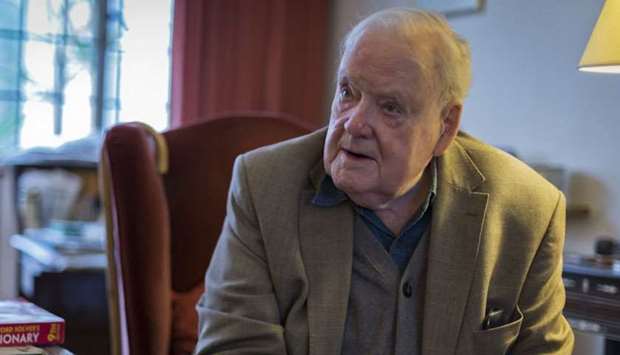"For me it’s quite incredible what Qatar has achieved. An astonishing development and I would say full marks to the Qataris for their achievement in getting that massive development of their country"
A British oil engineer who helped introduce football to the Middle East has spoken of his pride that 70 years later Qatar is on the brink of hosting the first World Cup in the region.
When former BP worker Tom Clayton, 92, first arrived in Qatar in 1948 the local population had hardly even seen soccer being played.
But it wasn’t long before they were watching the ‘strange spectacle’ of UK oil exploration workers and their Indian colleagues kicking a ball about in the desert using sacks as goals.
At the time Qatar was still a quite a sparse country with not even a road linking the oil field at Dukhan with the capital, Doha.
Local tribesmen would be called upon to help with drilling operations being carried out by the Iraq Petroleum Company.
“To start with it was mainly Indian workers playing with a few of the British production engineers who would teach them the rules," said Tom, from Wimbledon, South West London. "One of my diary entries just reads: ‘The Brits won!’"
The Indian clerical staff were able to play the most because they shift workers as opposed to many of the British who were working flat out to get the oil production going.
But over the years, as more Brits arrived, football became a much bigger part of camp life with cup competitions and leagues established.
The Qataris found the game of football an odd but amusing sight.
"We had no idea of sports like that, but we used to enjoy watching the strange spectacle," recalled Ibrahim al-Muhannadi, a government official and member of the Qatar Olympic Committee.
Before Qatar, Tom was based in Kirkuk, Iraq, where he played in the inside left position in a team of oil workers. Before that it was also British riggers who had introduced Iran to football in the 1920s.
Now the father-of-two, who went on to work for BP before retiring in 1986, can’t quite believe that the country where he rubbed shoulder with local Bedouin tribesmen is now the richest in the world per capita.
Speaking four years before the first ball is kicked at the start of the 2022 tournament, he said: "For me it’s quite incredible what Qatar has achieved. An astonishing development and I would say full marks to the Qataris for their achievement in getting that massive development of their country.
"I think it’s incredible that they’ve come so far so quickly. I really do take my hat off to them."
It wasn’t only football which the British oil workers brought to Qatar, but also the game of golf.
Tom recalled: "There was no grass. We carried a square of artificial grass and wherever the ball landed in the sand you put down your grass and played off that. I’d brought an old pair of clubs with me from Iraq."
BP records show that from 1951 to 1953 the British and Indian employees of Petroleum Development (Qatar) Ltd were playing regular competitions.
The winners were presented with their trophy by George Heseldin, the company’s general manager, who financed the first league matches.
His daughter, Diana Rahme, said: "It started out with people being bored, having nothing to do and having a football and kicking it round a field."
It wasn’t long before football was taking off across the country. This led to the Qatar Football Association being set in 1960 and the country’s national association was recognised by FIFA a decade later in 1970.
Hassan al-Thawadi, Secretary General of the Supreme Committee said: ‘In four years’ time 1.5mn fans will descend on Qatar from every corner of the globe and billions more will tune in on their TVs, smartphones and tablets to watch 28 days of football.
"It will be a momentous occasion for the teams participating, the fans watching and for the whole Arab world, which is eagerly anticipating hosting the showpiece event of the most popular sport in the world for the first time ever."

